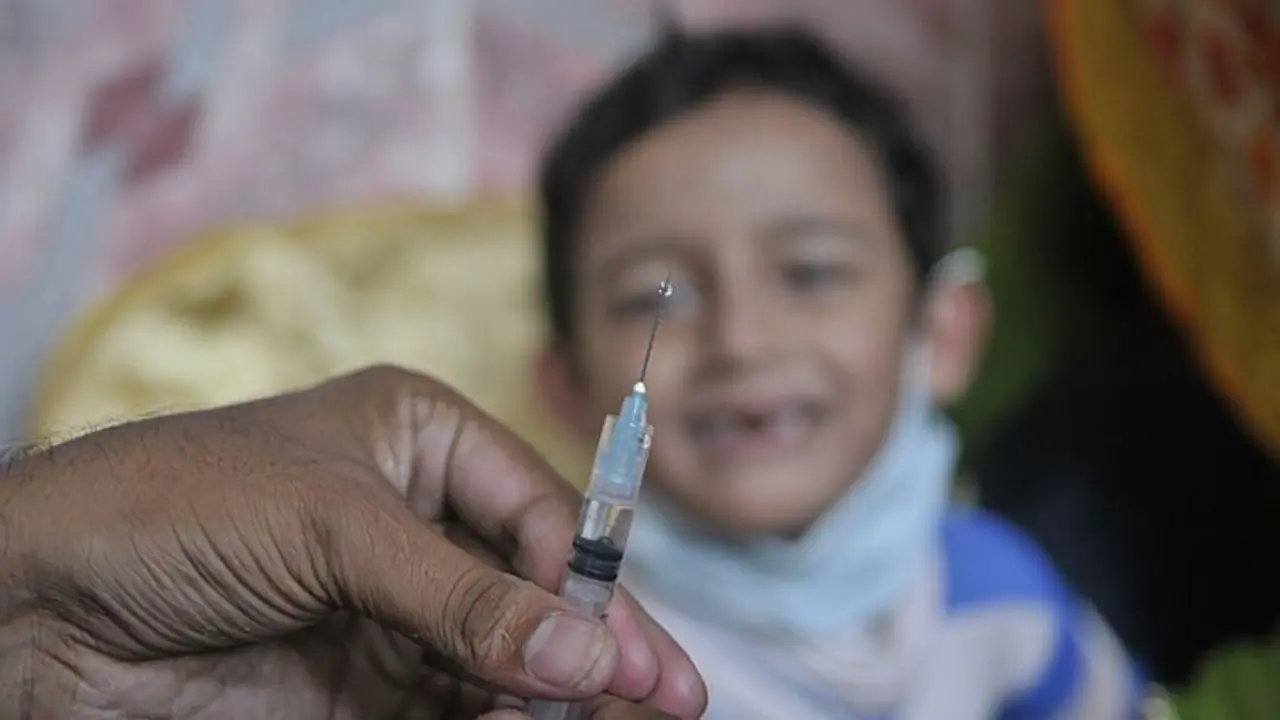According to the WHO and UNICEF, a bad situation has worsened due to the Covid-19 pandemic
Here is some worrying data shared by the World Health Organisation. In 2020, over 23 million children did not receive the basic vaccines that they would have through routine immunisation services.

This figure, according to the WHO and UNICEF, stood at 3.7 million in 2019. In India alone, over 3.03 million or over 30 lakh children have not received their first dose of diphtheria-tetanus-pertussis combined vaccine or DPT-1.
The data provided 160 countries, first since the pandemic, shows global service disruptions. It also shows that a majority of countries experienced low rates and dips in childhood vaccinations.
The vaccines for 13 diseases would have been given through the regular health systems using clinics or healthcare worker visitors. Most of these children did not receive a single vaccine, almost 17 million children, and this has widened the gap between unequal access to vaccines.
Most of the children who have not received their vaccines live in hard-to-reach areas which are underserved and ridden with conflict, along with poor areas like slums where access is limited and scarce.
WHO Director-General Dr Tedros Adhanom Ghebreyesus said that even as nations clamour to get their hands on Covid-19 vaccines, they have gone backwards on other vaccinations. This has left children at risk of getting preventable diseases like measles, polio or meningitis.
He also said that amid the Covid-19 pandemic, multiple disease outbreaks would be catastrophic, and thus it is more urgent than ever to invest in childhood vaccination and ensure every child is reached.
Currently, 57 mass vaccination campaigns in 66 countries were also postponed for disease like measles, polio, yellow fever and other diseases which has and will continue to affect a large number of the world's population.
In 2020, an increasing number of children did not receive their first vital vaccines, and many missed their later vaccines.
The WHO's Southeast Asian and Eastern Mediterranean Regions were most disrupted in 2020, and access to health care services and immunisation sources lessened and were not accessible for many.
The number of children not receiving their vaccines increased, as compared with last year, 3.5 million more children missed their first DTP-1 dose whilst 3 million more missed their measles dose.
UNICEF Executive Director Henrietta Force said this data should be a clear warning -- the pandemic and related disruptions cost us valuable ground the world cannot afford to lose.
A bad situation has worsened due to the Covid-19 pandemic, Henrietta said.
The country in which the number of children not receiving their first dose of DTP-1 is the highest compared with 2019 in India, where the drop in coverage was from 91% to 85% and the number increased from 1,403,000 to 3,038,000.
Behind India was Pakistan, where the number increased from 567,000 unvaccinated to 968,000.
The data shows that middle-income countries account for an increasing number of unvaccinated children. This is mainly because of lack of funding, misinformation, instability, and in WHO's Region of the Americas, the rate of vaccination coverage continues to fall with only 82% fully vaccinated as compared with 2016 when the for DTP was 91%.
Globally the vaccination rate for the DTP vaccines (3 of them) fell from 86% in 2019 to 83% in 2020 -- indicating that 22.7 million children did not receive their vaccines; for measles, the rate was 71% from 70% 2019 but in order to control the disease 95% is required and counties that do not have the resources to reach such a rate rely on periodic nationwide programs that help bridge the gap.
The dip in vaccinations is not entirely due to the Covid pandemic, as the global childhood vaccination rates against vaccine-preventable diseases were already falling and had stalled for years at about 86%.
The rate recommended by the WHO is 95% to protect against preventable diseases like measles which is the first to surge without vaccinations. The pandemic has demanded resources and personnel that would have been working in global immunisation otherwise and therefore caused a big disruption.
In most countries, clinics have been closed or open for a short window, but people have been not seeking healthcare due to fears of the coronavirus and its transmission, along with many mobile services not being able to work due to restrictions and transport bans.
However, the concern is not only for outbreak-prone transmissible diseases but also diseases like HPV, human papillomavirus, which can cause cervical cancer in girls and the vaccinations for which have also seen a 2% dip in 2020 at 13% globally versus 15% in 2019 highly effected by schools closing -- this means globally about 1.6 million more girls did not get the vaccine.
Agencies like the WHO and UNICEF have called for urgent recovery and funding in the routine immunisation processes; they are also helping to strengthen immunisation, including for Covid, around the world by restoring services and introducing vaccination campaigns so countries can deliver vaccinations during the pandemic safely, by helping healthcare and community workers and leaders communicate the importance of vaccines, by helping bridge the immunisation gaps that have existed and emerged for those who have limited healthcare access, by making sure that covid vaccination programs and delivery are treated separately and independently, so it does not hinder with routine vaccinations and by implementing country plans to prevent and manage outbreaks of preventable diseases if they are to occur.
